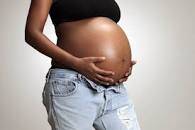Eating a healthy and balanced diet is essential during pregnancy to support the growth and development of the baby. However, there are some foods that should be avoided during pregnancy due to the risk of foodborne illness or other health concerns. Here are some foods to avoid during pregnancy.
Raw or undercooked meat and eggs: Raw or undercooked meat and eggs may contain harmful bacteria such as Salmonella, E. coli, and Listeria, which can cause foodborne illness. It is important to cook meat and eggs thoroughly to kill any harmful bacteria.
Raw or undercooked seafood: Raw or undercooked seafood may also contain harmful bacteria and should be avoided during pregnancy. Fish with high levels of mercury such as shark, swordfish, king mackerel, and tilefish should also be avoided.
Deli meats and unpasteurized dairy products: Deli meats and unpasteurized dairy products may also contain harmful bacteria and should be avoided during pregnancy. It is important to choose pasteurized dairy products and to heat deli meats until they are steaming hot before eating.
Raw sprouts: Raw sprouts such as alfalfa, clover, and radish may also contain harmful bacteria and should be avoided during pregnancy.
Caffeine: High levels of caffeine intake during pregnancy have been linked to an increased risk of miscarriage and low birth weight. It is recommended to limit caffeine intake to no more than 200mg per day, which is equivalent to one 12-ounce cup of coffee.
Alcohol: Drinking alcohol during pregnancy can cause fetal alcohol syndrome, which can lead to physical and developmental problems in the baby. It is recommended to avoid alcohol during pregnancy.
In conclusion, eating a healthy and balanced diet is important during pregnancy to support the growth and development of the baby. However, there are some foods that should be avoided due to the risk of foodborne illness or other health concerns. By avoiding raw or undercooked meat and eggs, raw or undercooked seafood, deli meats and unpasteurized dairy products, raw sprouts, caffeine, and alcohol, pregnant women can ensure a healthy and safe pregnancy. It is important to talk to a healthcare provider for personalized dietary advice during pregnancy.




No comments yet
Be the first to share your thoughts!